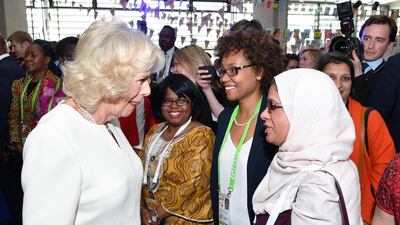When the leaders of 53 countries, representing 2.4 billion people – around a third of humanity – and coming from states such as Britain, India and South Africa, gather for several days of discussions, dinners and forums, you might expect the world to take notice.
That is not always the case with the biannual Commonwealth Heads of Government Meeting, or CHOGM. The organisation may be, according to the British peer Lord Howell, "a latticework of connections unmatched by any other world institution or network", but it is often dismissed as a talking shop, while its own secretariat's staff have sometimes been quite rude about how effective it actually is.
But this week’s CHOGM in London is a big deal for Britain’s Theresa May, who in the run up was busy trying to cajole as many heads of government to attend in person, rather than sending representatives. And the reason for that, of course, is that “Global Britain” is going to be looking for new partners – and sharpish – once it leaves the European Union.
The Commonwealth, an Anglophone collection of mostly former British colonies headed by the Queen, is the obvious answer to how the UK will prosper when it inevitably ends up with a trading relationship with the EU inferior to the one it enjoys as a member.
There is still a lot of residual Anglophilia in much of the Commonwealth. Some of this is focused particularly on the Queen, and while Prince Charles is likely to succeed her as its head, the role is not hereditary. Nevertheless, the UK is lucky enough to enjoy wells of goodwill towards Britain and the British in its former colonies. But this alone is far from being enough to assume a success can be made of this strategy.
Firstly, it should not be forgotten that the UK did choose the then European Economic Community over the Commonwealth back in 1973. There may be few who still feel strongly that this was “an abrupt betrayal… Britain turned its back on its allies overseas”, as an Irish Times commentary put it after the Brexit vote in 2016. But all the same, a little humility is due.
But secondly, if Britons think they can just turn on the charm and dazzle with royal pomp and, lo and behold, the Commonwealth will miraculously become “Empire 2.0”, as the former Labour cabinet minister Peter Mandelson put it, they are “living in a fool’s paradise”. (Not that anyone would want to create Empire 2.0 anyway).
Commonwealth countries made their own ways once the UK joined Europe. While many would welcome the organisation assuming a greater role, the UK will have to make much more of a tempting offer for them to commit seriously to the kind of trade deals the Brexiteers have pinned part of their hopes on.
The Institute of Directors’ Allie Rennison made this point earlier this week when she wrote that "the UK will have to talk to New Delhi about easing restrictions on work visas if it is serious about a trade deal, and so it should". I would agree. But then I have always been one of those Eurosceptics who felt that being in the EU meant that we were discriminating in favour of Europeans and against countries with which we had strong historical ties.
Allowing a larger number of Indians, or Africans, or let's be honest, any non-white people, into Britain would, however, not please the large anti-immigration crowd. Personally, I would applaud it. One could even argue that as the former imperial power, Britain still has obligations to the countries it ruled and whose natural and human resources it exploited. But it would take both bravery and dexterity for any British politician to announce, let alone implement, such a policy.
The UK also has to wake up to the fact that it is not the "British" Commonwealth, and that has not been its name for a very long time – since 1947, in fact. There has to be an acknowledgement that while Britain may be a leading state in the Commonwealth, it should be no more than "first among equals" at most, and even that is not defensible for long. In the near future the organisation has to develop a more collegiate leadership. It may be sensible, for instance, to make the British monarch its patron – maybe one of several - and create a rotating executive chairmanship that would be filled by leaders from other nations.
There can also never, ever be a repetition of the 1987 CHOGM when Britain’s then prime minister Margaret Thatcher stood stubbornly against the whole of the rest of the Commonwealth over imposing sanctions on apartheid South Africa.
I wish the Commonwealth well. Any organisation that brings countries together from around the world and helps them understand each other and celebrate what they have in common, rather than let divisions based on ignorance, colour or creed fester, is to be welcomed.
But if leading Tories think of it as a British club that they let slip into irrelevance for decades, but can now revive to suit their own interests, they are sorely mistaken. If, on the other hand, they are prepared to be realistic, generous and seriously committed, there could be much to be gained, including enhanced trading relations, by all the countries that are a part of the Commonwealth, and not just the UK.
The question is: do UK politicians view the Commonwealth solely as a vehicle for their own national self-interests? Or does “Global Britain” have the courage and vision to act truly globally?
Sholto Byrnes is a senior fellow at the Institute of Strategic and International Studies Malaysia


